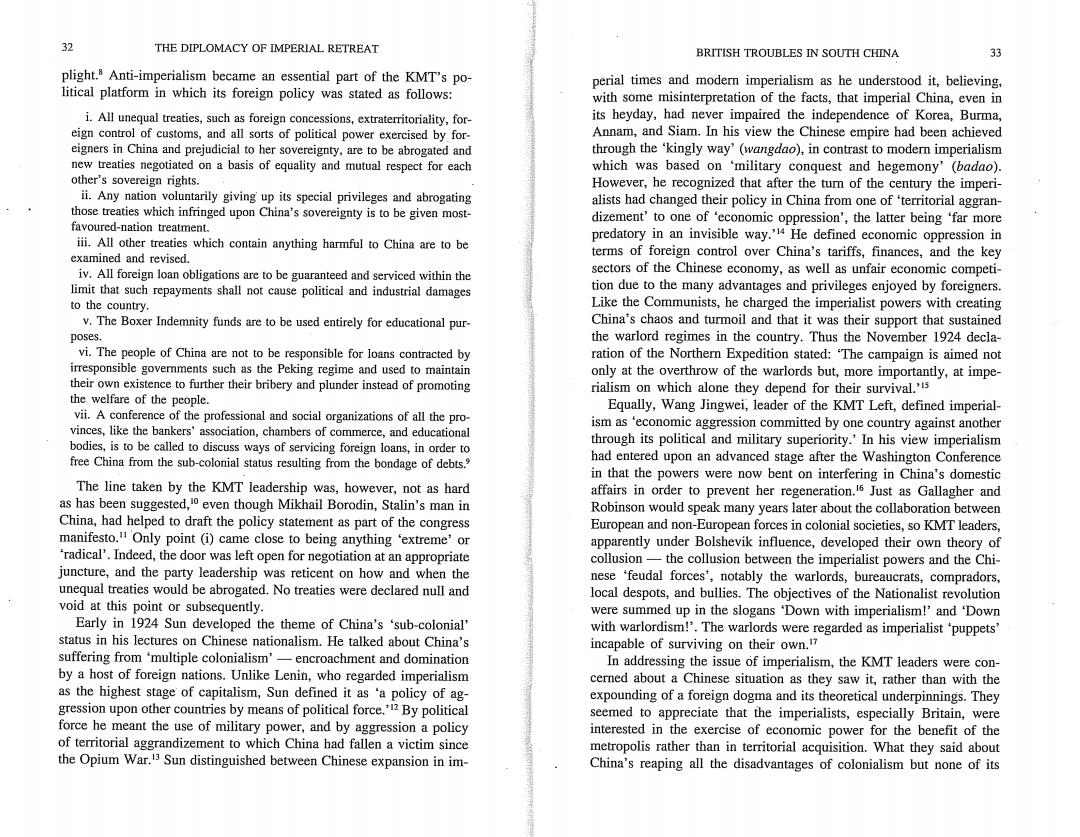
32 THE DIPLOMACY OF IMPERIAL RETREAT BRITISH TROUBLES IN SOUTH CHINA 33 plight.3 Anti-imperialism became an essential part of the KMT's po- perial times and modern imperialism as he understood it,believing, litical platform in which its foreign policy was stated as follows: with some misinterpretation of the facts,that imperial China,even in i.All unequal treaties,such as foreign concessions,extraterritoriality,for- its heyday,had never impaired the independence of Korea,Burma, eign control of customs,and all sorts of political power exercised by for- Annam,and Siam.In his view the Chinese empire had been achieved eigners in China and prejudicial to her sovereignty,are to be abrogated and through the 'kingly way'(wangdao),in contrast to modern imperialism new treaties negotiated on a basis of equality and mutual respect for each which was based on 'military conquest and hegemony'(badao). other's sovereign rights. However,he recognized that after the turn of the century the imperi- ii.Any nation voluntarily giving up its special privileges and abrogating alists had changed their policy in China from one of 'territorial aggran- those treaties which infringed upon China's sovereignty is to be given most- favoured-nation treatment. dizement'to one of 'economic oppression',the latter being 'far more iii.All other treaties which contain anything harmful to China are to be predatory in an invisible way.'14 He defined economic oppression in examined and revised. terms of foreign control over China's tariffs,finances,and the key iv.All foreign loan obligations are to be guaranteed and serviced within the sectors of the Chinese economy,as well as unfair economic competi- limit that such repayments shall not cause political and industrial damages tion due to the many advantages and privileges enjoyed by foreigners. to the country. Like the Communists,he charged the imperialist powers with creating v.The Boxer Indemnity funds are to be used entirely for educational pur- China's chaos and turmoil and that it was their support that sustained poses. the warlord regimes in the country.Thus the November 1924 decla- vi.The people of China are not to be responsible for loans contracted by ration of the Northern Expedition stated:'The campaign is aimed not irresponsible governments such as the Peking regime and used to maintain only at the overthrow of the warlords but,more importantly,at impe- their own existence to further their bribery and plunder instead of promoting rialism on which alone they depend for their survival.'5 the welfare of the people. Equally,Wang Jingwei,leader of the KMT Left,defined imperial- vii.A conference of the professional and social organizations of all the pro- vinces,like the bankers'association,chambers of commerce,and educational ism as 'economic aggression committed by one country against another bodies,is to be called to discuss ways of servicing foreign loans,in order to through its political and military superiority.'In his view imperialism free China from the sub-colonial status resulting from the bondage of debts. had entered upon an advanced stage after the Washington Conference in that the powers were now bent on interfering in China's domestic The line taken by the KMT leadership was,however,not as hard affairs in order to prevent her regeneration.6 Just as Gallagher and as has been suggested,0 even though Mikhail Borodin,Stalin's man in Robinson would speak many years later about the collaboration between China,had helped to draft the policy statement as part of the congress European and non-European forces in colonial societies,so KMT leaders, manifesto.Only point (i)came close to being anything 'extreme'or apparently under Bolshevik influence,developed their own theory of radical'.Indeed,the door was left open for negotiation at an appropriate collusion-the collusion between the imperialist powers and the Chi- juncture,and the party leadership was reticent on how and when the nese feudal forces',notably the warlords,bureaucrats,compradors, unequal treaties would be abrogated.No treaties were declared null and local despots,and bullies.The objectives of the Nationalist revolution void at this point or subsequently. were summed up in the slogans 'Down with imperialism!'and 'Down Early in 1924 Sun developed the theme of China's 'sub-colonial' with warlordism!'.The warlords were regarded as imperialist 'puppets' status in his lectures on Chinese nationalism.He talked about China's incapable of surviving on their own.7 suffering from 'multiple colonialism'-encroachment and domination In addressing the issue of imperialism,the KMT leaders were con- by a host of foreign nations.Unlike Lenin,who regarded imperialism cerned about a Chinese situation as they saw it,rather than with the as the highest stage of capitalism,Sun defined it as 'a policy of ag- expounding of a foreign dogma and its theoretical underpinnings.They gression upon other countries by means of political force.'12 By political seemed to appreciate that the imperialists,especially Britain,were force he meant the use of military power,and by aggression a policy interested in the exercise of economic power for the benefit of the of territorial aggrandizement to which China had fallen a victim since metropolis rather than in territorial acquisition.What they said about the Opium War.3 Sun distinguished between Chinese expansion in im- China's reaping all the disadvantages of colonialism but none of its
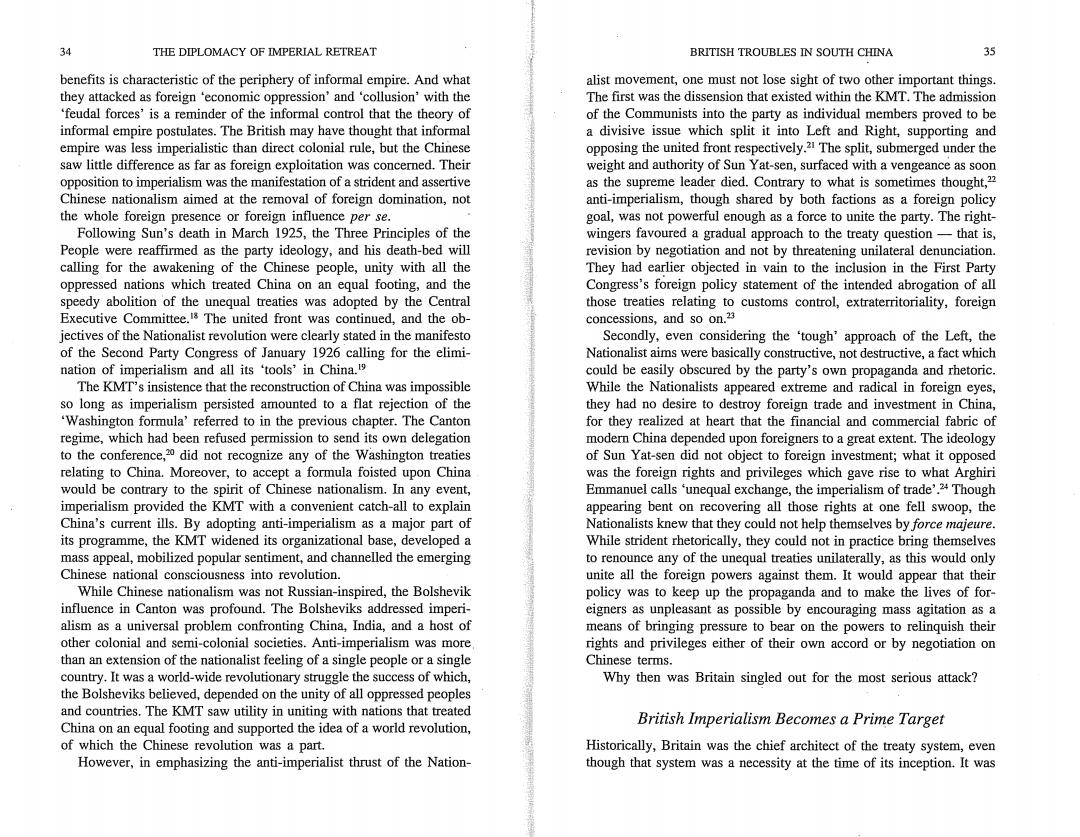
34 THE DIPLOMACY OF IMPERIAL RETREAT BRITISH TROUBLES IN SOUTH CHINA 35 benefits is characteristic of the periphery of informal empire.And what alist movement,one must not lose sight of two other important things. they attacked as foreign 'economic oppression'and 'collusion'with the The first was the dissension that existed within the KMT.The admission 'feudal forces'is a reminder of the informal control that the theory of of the Communists into the party as individual members proved to be informal empire postulates.The British may have thought that informal a divisive issue which split it into Left and Right,supporting and empire was less imperialistic than direct colonial rule,but the Chinese opposing the united front respectively.21 The split,submerged under the saw little difference as far as foreign exploitation was concerned.Their weight and authority of Sun Yat-sen,surfaced with a vengeance as soon opposition to imperialism was the manifestation of a strident and assertive as the supreme leader died.Contrary to what is sometimes thought,22 Chinese nationalism aimed at the removal of foreign domination,not anti-imperialism,though shared by both factions as a foreign policy the whole foreign presence or foreign influence per se. goal,was not powerful enough as a force to unite the party.The right- Following Sun's death in March 1925,the Three Principles of the wingers favoured a gradual approach to the treaty question-that is, People were reaffirmed as the party ideology,and his death-bed will revision by negotiation and not by threatening unilateral denunciation. calling for the awakening of the Chinese people,unity with all the They had earlier objected in vain to the inclusion in the First Party oppressed nations which treated China on an equal footing,and the Congress's foreign policy statement of the intended abrogation of all speedy abolition of the unequal treaties was adopted by the Central those treaties relating to customs control,extraterritoriality,foreign Executive Committee.8 The united front was continued,and the ob- concessions,and so on.23 jectives of the Nationalist revolution were clearly stated in the manifesto Secondly,even considering the 'tough'approach of the Left,the of the Second Party Congress of January 1926 calling for the elimi- Nationalist aims were basically constructive,not destructive,a fact which nation of imperialism and all its 'tools'in China.19 could be easily obscured by the party's own propaganda and rhetoric. The KMT's insistence that the reconstruction of China was impossible While the Nationalists appeared extreme and radical in foreign eyes, so long as imperialism persisted amounted to a flat rejection of the they had no desire to destroy foreign trade and investment in China, 'Washington formula'referred to in the previous chapter.The Canton for they realized at heart that the financial and commercial fabric of regime,which had been refused permission to send its own delegation modern China depended upon foreigners to a great extent.The ideology to the conference,0 did not recognize any of the Washington treaties of Sun Yat-sen did not object to foreign investment;what it opposed relating to China.Moreover,to accept a formula foisted upon China was the foreign rights and privileges which gave rise to what Arghiri would be contrary to the spirit of Chinese nationalism.In any event, Emmanuel calls 'unequal exchange,the imperialism of trade'Though imperialism provided the KMT with a convenient catch-all to explain appearing bent on recovering all those rights at one fell swoop,the China's current ills.By adopting anti-imperialism as a major part of Nationalists knew that they could not help themselves by force majeure. its programme,the KMT widened its organizational base,developed a While strident rhetorically,they could not in practice bring themselves mass appeal,mobilized popular sentiment,and channelled the emerging to renounce any of the unequal treaties unilaterally,as this would only Chinese national consciousness into revolution. unite all the foreign powers against them.It would appear that their While Chinese nationalism was not Russian-inspired,the Bolshevik policy was to keep up the propaganda and to make the lives of for- influence in Canton was profound.The Bolsheviks addressed imperi- eigners as unpleasant as possible by encouraging mass agitation as a alism as a universal problem confronting China,India,and a host of means of bringing pressure to bear on the powers to relinquish their other colonial and semi-colonial societies.Anti-imperialism was more rights and privileges either of their own accord or by negotiation on than an extension of the nationalist feeling of a single people or a single Chinese terms. country.It was a world-wide revolutionary struggle the success of which, Why then was Britain singled out for the most serious attack? the Bolsheviks believed,depended on the unity of all oppressed peoples and countries.The KMT saw utility in uniting with nations that treated China on an equal footing and supported the idea of a world revolution, British Imperialism Becomes a Prime Target of which the Chinese revolution was a part. Historically,Britain was the chief architect of the treaty system,even However,in emphasizing the anti-imperialist thrust of the Nation- though that system was a necessity at the time of its inception.It was
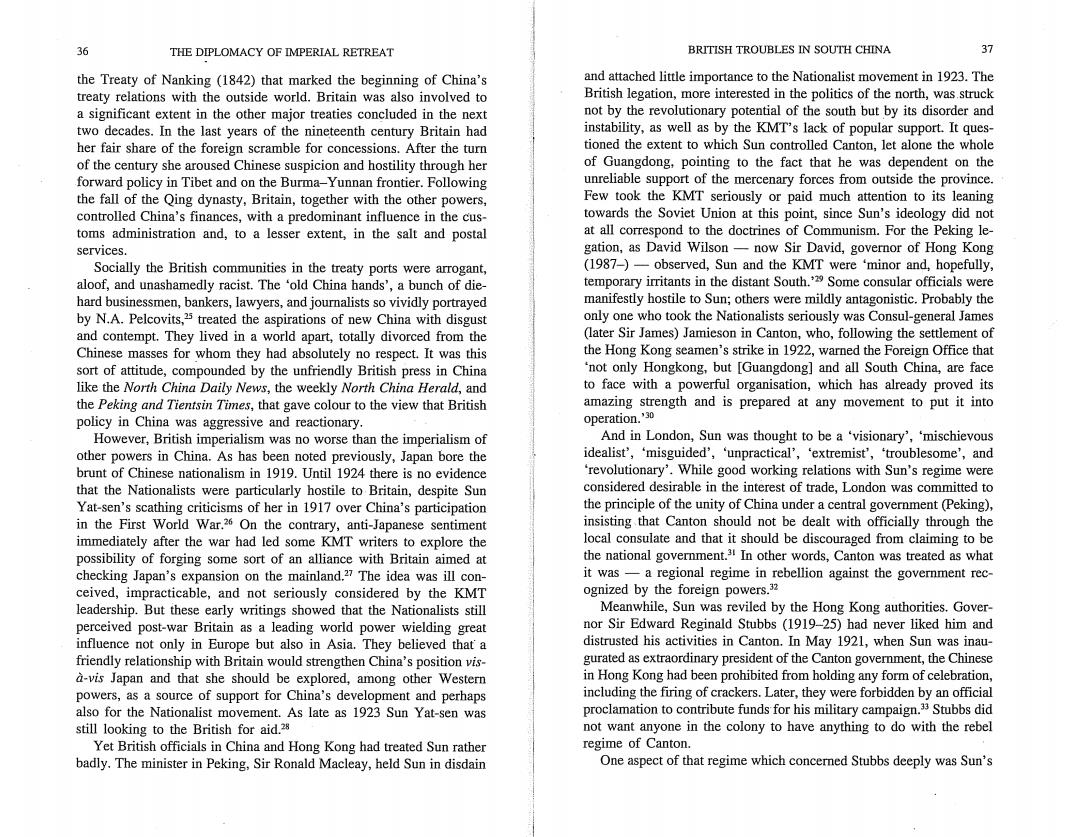
36 THE DIPLOMACY OF IMPERIAL RETREAT BRITISH TROUBLES IN SOUTH CHINA 37 the Treaty of Nanking (1842)that marked the beginning of China's and attached little importance to the Nationalist movement in 1923.The treaty relations with the outside world.Britain was also involved to British legation,more interested in the politics of the north,was struck a significant extent in the other major treaties concluded in the next not by the revolutionary potential of the south but by its disorder and two decades.In the last years of the nineteenth century Britain had instability,as well as by the KMT's lack of popular support.It ques- her fair share of the foreign scramble for concessions.After the turn tioned the extent to which Sun controlled Canton,let alone the whole of the century she aroused Chinese suspicion and hostility through her of Guangdong,pointing to the fact that he was dependent on the forward policy in Tibet and on the Burma-Yunnan frontier.Following unreliable support of the mercenary forces from outside the province. the fall of the Qing dynasty,Britain,together with the other powers, Few took the KMT seriously or paid much attention to its leaning controlled China's finances,with a predominant influence in the cus- towards the Soviet Union at this point,since Sun's ideology did not toms administration and,to a lesser extent,in the salt and postal at all correspond to the doctrines of Communism.For the Peking le- services. gation,as David Wilson-now Sir David,governor of Hong Kong Socially the British communities in the treaty ports were arrogant, (1987-)-observed,Sun and the KMT were 'minor and,hopefully, aloof,and unashamedly racist.The 'old China hands',a bunch of die- temporary irritants in the distant South."Some consular officials were hard businessmen,bankers,lawyers,and journalists so vividly portrayed manifestly hostile to Sun;others were mildly antagonistic.Probably the by N.A.Pelcovits,25 treated the aspirations of new China with disgust only one who took the Nationalists seriously was Consul-general James and contempt.They lived in a world apart,totally divorced from the (later Sir James)Jamieson in Canton,who,following the settlement of Chinese masses for whom they had absolutely no respect.It was this the Hong Kong seamen's strike in 1922,warned the Foreign Office that sort of attitude,compounded by the unfriendly British press in China 'not only Hongkong,but [Guangdong]and all South China,are face like the North China Daily News,the weekly North China Herald,and to face with a powerful organisation,which has already proved its the Peking and Tientsin Times,that gave colour to the view that British amazing strength and is prepared at any movement to put it into policy in China was aggressive and reactionary. operation.'30 However,British imperialism was no worse than the imperialism of And in London,Sun was thought to be a 'visionary','mischievous other powers in China.As has been noted previously,Japan bore the idealist','misguided','unpractical','extremist','troublesome',and brunt of Chinese nationalism in 1919.Until 1924 there is no evidence 'revolutionary'.While good working relations with Sun's regime were that the Nationalists were particularly hostile to Britain,despite Sun considered desirable in the interest of trade,London was committed to Yat-sen's scathing criticisms of her in 1917 over China's participation the principle of the unity of China under a central government(Peking), in the First World War.?6 On the contrary,anti-Japanese sentiment insisting that Canton should not be dealt with officially through the immediately after the war had led some KMT writers to explore the local consulate and that it should be discouraged from claiming to be possibility of forging some sort of an alliance with Britain aimed at the national government.3!In other words,Canton was treated as what checking Japan's expansion on the mainland.27 The idea was ill con- it was-a regional regime in rebellion against the government rec- ceived,impracticable,and not seriously considered by the KMT ognized by the foreign powers.32 leadership.But these early writings showed that the Nationalists still Meanwhile,Sun was reviled by the Hong Kong authorities.Gover- perceived post-war Britain as a leading world power wielding great nor Sir Edward Reginald Stubbs (1919-25)had never liked him and influence not only in Europe but also in Asia.They believed that a distrusted his activities in Canton.In May 1921,when Sun was inau- friendly relationship with Britain would strengthen China's position vis- gurated as extraordinary president of the Canton government,the Chinese a-vis Japan and that she should be explored,among other Western in Hong Kong had been prohibited from holding any form of celebration, powers,as a source of support for China's development and perhaps including the firing of crackers.Later,they were forbidden by an official also for the Nationalist movement.As late as 1923 Sun Yat-sen was proclamation to contribute funds for his military campaign.33 Stubbs did still looking to the British for aid.? not want anyone in the colony to have anything to do with the rebel Yet British officials in China and Hong Kong had treated Sun rather regime of Canton. badly.The minister in Peking,Sir Ronald Macleay,held Sun in disdain One aspect of that regime which concerned Stubbs deeply was Sun's
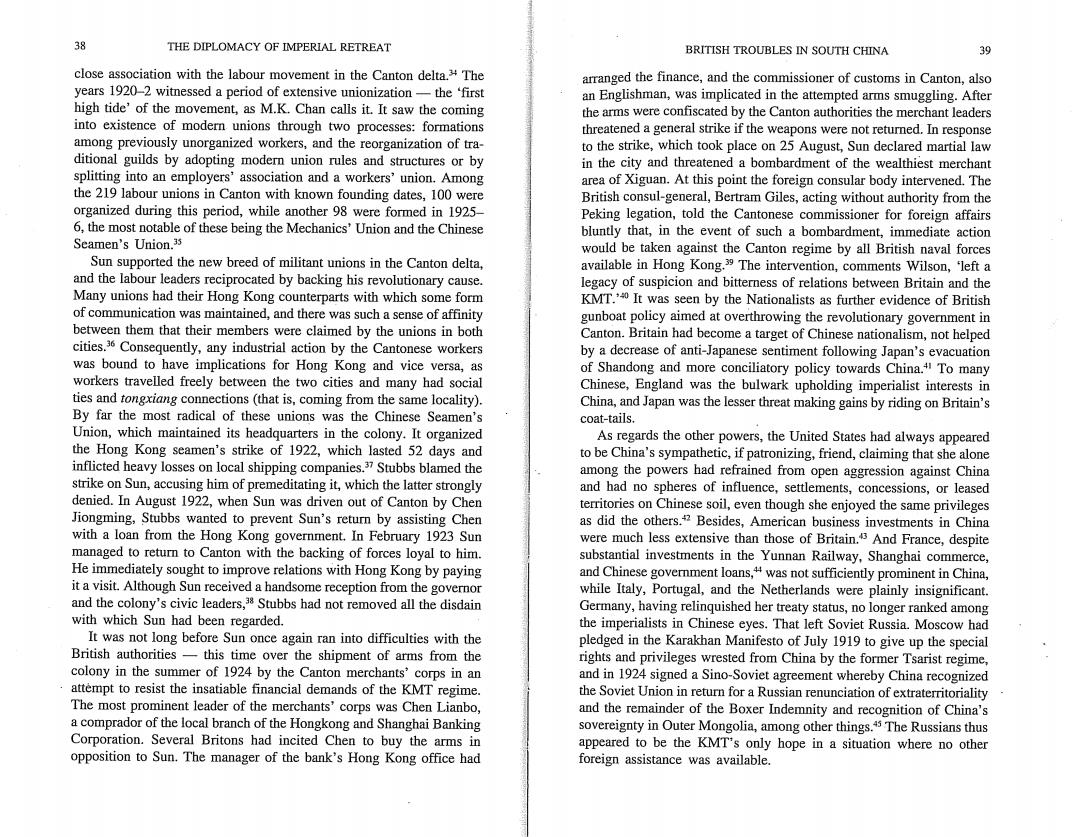
38 THE DIPLOMACY OF IMPERIAL RETREAT BRITISH TROUBLES IN SOUTH CHINA 39 close association with the labour movement in the Canton delta.#The arranged the finance,and the commissioner of customs in Canton,also years 1920-2 witnessed a period of extensive unionization-the first an Englishman,was implicated in the attempted arms smuggling.After high tide'of the movement,as M.K.Chan calls it.It saw the coming the arms were confiscated by the Canton authorities the merchant leaders into existence of modern unions through two processes:formations threatened a general strike if the weapons were not returned.In response among previously unorganized workers,and the reorganization of tra- to the strike,which took place on 25 August,Sun declared martial law ditional guilds by adopting modern union rules and structures or by in the city and threatened a bombardment of the wealthiest merchant splitting into an employers'association and a workers'union.Among area of Xiguan.At this point the foreign consular body intervened.The the 219 labour unions in Canton with known founding dates,100 were British consul-general,Bertram Giles,acting without authority from the organized during this period,while another 98 were formed in 1925- Peking legation,told the Cantonese commissioner for foreign affairs 6,the most notable of these being the Mechanics'Union and the Chinese bluntly that,in the event of such a bombardment,immediate action Seamen's Union.35 would be taken against the Canton regime by all British naval forces Sun supported the new breed of militant unions in the Canton delta, available in Hong Kong.39 The intervention,comments Wilson,'left a and the labour leaders reciprocated by backing his revolutionary cause. legacy of suspicion and bitterness of relations between Britain and the Many unions had their Hong Kong counterparts with which some form KMT.'40 It was seen by the Nationalists as further evidence of British of communication was maintained,and there was such a sense of affinity gunboat policy aimed at overthrowing the revolutionary government in between them that their members were claimed by the unions in both Canton.Britain had become a target of Chinese nationalism,not helped cities.36 Consequently,any industrial action by the Cantonese workers by a decrease of anti-Japanese sentiment following Japan's evacuation was bound to have implications for Hong Kong and vice versa,as of Shandong and more conciliatory policy towards China.To many workers travelled freely between the two cities and many had social Chinese,England was the bulwark upholding imperialist interests in ties and tongxiang connections (that is,coming from the same locality). China,and Japan was the lesser threat making gains by riding on Britain's By far the most radical of these unions was the Chinese Seamen's coat-tails. Union,which maintained its headquarters in the colony.It organized As regards the other powers,the United States had always appeared the Hong Kong seamen's strike of 1922,which lasted 52 days and to be China's sympathetic,if patronizing,friend,claiming that she alone inflicted heavy losses on local shipping companies.37 Stubbs blamed the among the powers had refrained from open aggression against China strike on Sun,accusing him of premeditating it,which the latter strongly and had no spheres of influence,settlements,concessions,or leased denied.In August 1922,when Sun was driven out of Canton by Chen territories on Chinese soil,even though she enjoyed the same privileges Jiongming,Stubbs wanted to prevent Sun's return by assisting Chen as did the others.2 Besides,American business investments in China with a loan from the Hong Kong government.In February 1923 Sun were much less extensive than those of Britain.3 And France,despite managed to return to Canton with the backing of forces loyal to him. substantial investments in the Yunnan Railway,Shanghai commerce, He immediately sought to improve relations with Hong Kong by paying and Chinese government loans,4 was not sufficiently prominent in China, it a visit.Although Sun received a handsome reception from the governor while Italy,Portugal,and the Netherlands were plainly insignificant. and the colony's civic leaders,3 Stubbs had not removed all the disdain Germany,having relinquished her treaty status,no longer ranked among with which Sun had been regarded. the imperialists in Chinese eyes.That left Soviet Russia.Moscow had It was not long before Sun once again ran into difficulties with the pledged in the Karakhan Manifesto of July 1919 to give up the special British authorities-this time over the shipment of arms from the rights and privileges wrested from China by the former Tsarist regime, colony in the summer of 1924 by the Canton merchants'corps in an and in 1924 signed a Sino-Soviet agreement whereby China recognized attempt to resist the insatiable financial demands of the KMT regime. the Soviet Union in return for a Russian renunciation of extraterritoriality The most prominent leader of the merchants'corps was Chen Lianbo, and the remainder of the Boxer Indemnity and recognition of China's a comprador of the local branch of the Hongkong and Shanghai Banking sovereignty in Outer Mongolia,among other things.The Russians thus Corporation.Several Britons had incited Chen to buy the arms in appeared to be the KMT's only hope in a situation where no other opposition to Sun.The manager of the bank's Hong Kong office had foreign assistance was available
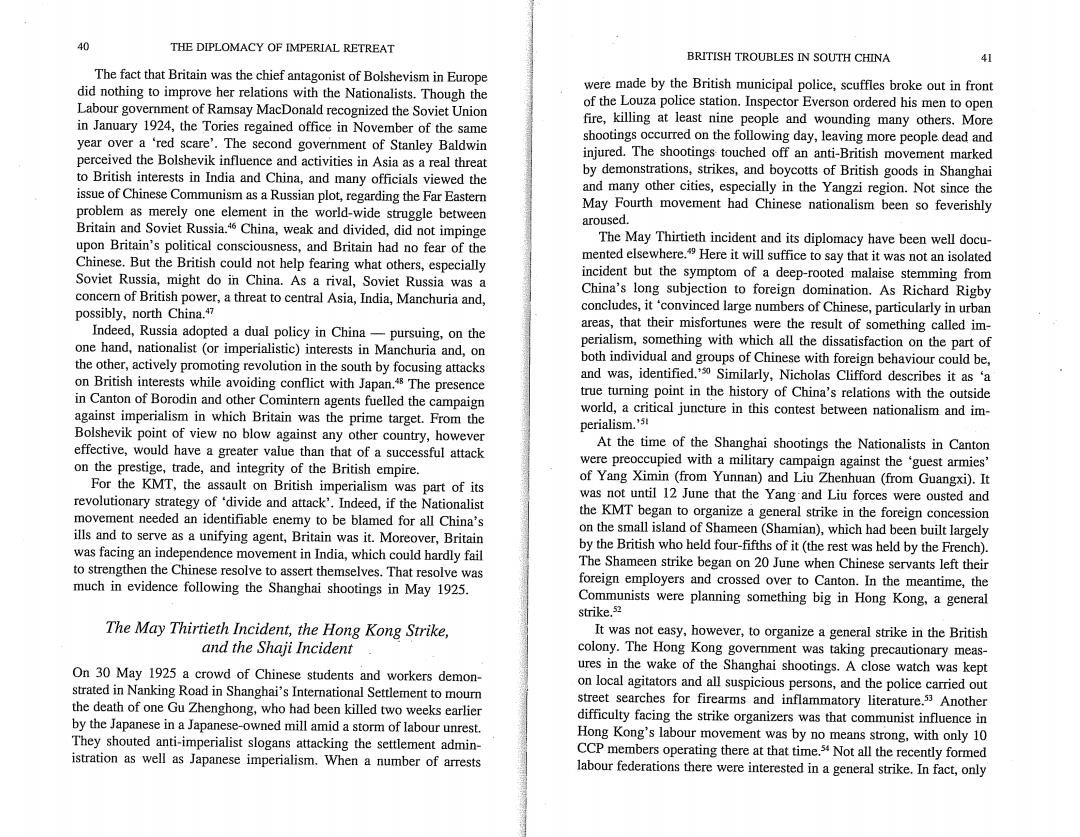
40 THE DIPLOMACY OF IMPERIAL RETREAT BRITISH TROUBLES IN SOUTH CHINA 刘 The fact that Britain was the chief antagonist of Bolshevism in Europe did nothing to improve her relations with the Nationalists.Though the were made by the British municipal police,scuffles broke out in front Labour government of Ramsay MacDonald recognized the Soviet Union of the Louza police station.Inspector Everson ordered his men to open in January 1924,the Tories regained office in November of the same fire,killing at least nine people and wounding many others.More year over a 'red scare'.The second government of Stanley Baldwin shootings occurred on the following day,leaving more people dead and perceived the Bolshevik influence and activities in Asia as a real threat injured.The shootings touched off an anti-British movement marked to British interests in India and China,and many officials viewed the by demonstrations,strikes,and boycotts of British goods in Shanghai issue of Chinese Communism as a Russian plot,regarding the Far Eastern and many other cities,especially in the Yangzi region.Not since the problem as merely one element in the world-wide struggle between May Fourth movement had Chinese nationalism been so feverishly Britain and Soviet Russia.6 China,weak and divided,did not impinge aroused. upon Britain's political consciousness,and Britain had no fear of the The May Thirtieth incident and its diplomacy have been well docu- Chinese.But the British could not help fearing what others,especially mented elsewhere.9 Here it will suffice to say that it was not an isolated Soviet Russia,might do in China.As a rival,Soviet Russia was a incident but the symptom of a deep-rooted malaise stemming from concern of British power,a threat to central Asia,India,Manchuria and, China's long subjection to foreign domination.As Richard Rigby possibly,north China.47 concludes,it'convinced large numbers of Chinese,particularly in urban Indeed,Russia adopted a dual policy in China-pursuing,on the areas,that their misfortunes were the result of something called im- one hand,nationalist (or imperialistic)interests in Manchuria and,on perialism,something with which all the dissatisfaction on the part of the other,actively promoting revolution in the south by focusing attacks both individual and groups of Chinese with foreign behaviour could be, on British interests while avoiding conflict with Japan.8 The presence and was,identified.'Similarly,Nicholas Clifford describes it as 'a in Canton of Borodin and other Comintern agents fuelled the campaign true turning point in the history of China's relations with the outside against imperialism in which Britain was the prime target.From the world,a critical juncture in this contest between nationalism and im- Bolshevik point of view no blow against any other country,however perialism.' effective,would have a greater value than that of a successful attack At the time of the Shanghai shootings the Nationalists in Canton on the prestige,trade,and integrity of the British empire. were preoccupied with a military campaign against the 'guest armies' For the KMT,the assault on British imperialism was part of its of Yang Ximin (from Yunnan)and Liu Zhenhuan (from Guangxi).It revolutionary strategy of'divide and attack'.Indeed,if the Nationalist was not until 12 June that the Yang and Liu forces were ousted and movement needed an identifiable enemy to be blamed for all China's the KMT began to organize a general strike in the foreign concession ills and to serve as a unifying agent,Britain was it.Moreover,Britain on the small island of Shameen (Shamian),which had been built largely was facing an independence movement in India,which could hardly fail by the British who held four-fifths of it(the rest was held by the French). to strengthen the Chinese resolve to assert themselves.That resolve was The Shameen strike began on 20 June when Chinese servants left their much in evidence following the Shanghai shootings in May 1925. foreign employers and crossed over to Canton.In the meantime,the Communists were planning something big in Hong Kong,a general strike.52 The May Thirtieth Incident,the Hong Kong Strike, It was not easy,however,to organize a general strike in the British and the Shaji Incident colony.The Hong Kong government was taking precautionary meas- On 30 May 1925 a crowd of Chinese students and workers demon- ures in the wake of the Shanghai shootings.A close watch was kept strated in Nanking Road in Shanghai's International Settlement to mourn on local agitators and all suspicious persons,and the police carried out the death of one Gu Zhenghong,who had been killed two weeks earlier street searches for firearms and inflammatory literature.33 Another by the Japanese in a Japanese-owned mill amid a storm of labour unrest. difficulty facing the strike organizers was that communist influence in They shouted anti-imperialist slogans attacking the settlement admin- Hong Kong's labour movement was by no means strong,with only 10 istration as well as Japanese imperialism.When a number of arrests CCP members operating there at that time.s Not all the recently formed labour federations there were interested in a general strike.In fact,only